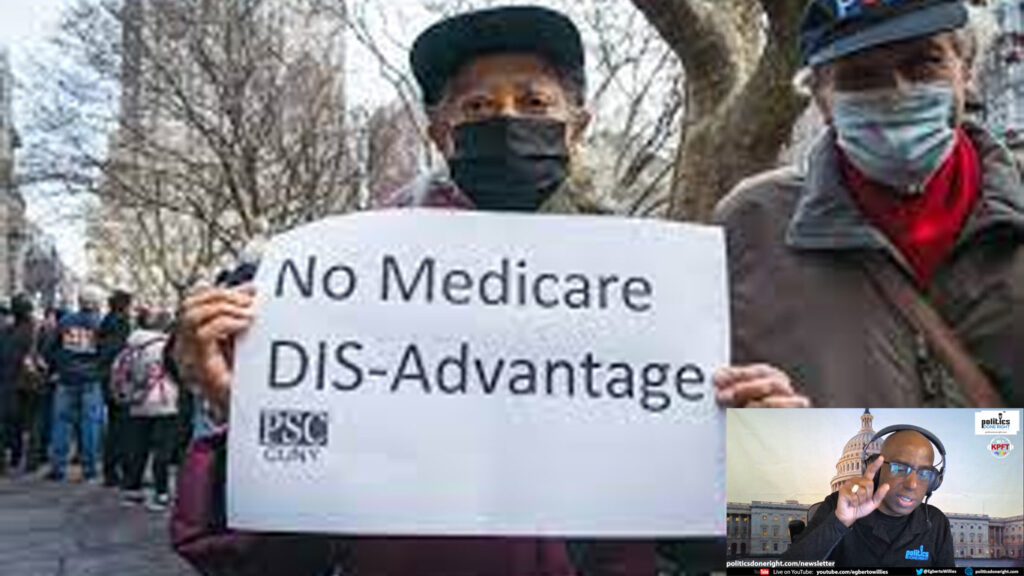After a caller said he loved his Medicare Advantage, I explained why it is a fraud, and everyone should stick with traditional Medicare if they can.
Why Medicare Advantage is a SCAM
Podcasts (Video — Audio)
In the complex world of healthcare policy, the discussion around Medicare and Medicare Advantage becomes a focal point for examining the intersection of government responsibility and private sector involvement in providing essential services. We need a critical perspective that is particularly relevant in ongoing debates about healthcare reform.
At the heart of Medicare’s philosophy is that healthcare, unlike consumer goods, should not be subject to the fluctuations and choices inherent in the market. This viewpoint challenges traditional ideas about consumer freedom, emphasizing instead the collective responsibility of ensuring universal healthcare access. This perspective is crucial in a landscape where healthcare access and affordability are persistently contentious. The principle that healthcare is a fundamental right rather than a market commodity underpins much of the argument for a more government-centric approach to healthcare.
The examination of the private insurance model reveals significant limitations, particularly in its profit-driven nature. This system often prioritizes the interests of shareholders and executives over patient care, a problem that becomes more pronounced as individuals age and their healthcare needs increase. The critique of this model reflects an acute awareness of the systemic issues within private healthcare and underscores the need for a more equitable approach to elderly care.
Medicare, initially established as a response to the private sector’s failure to adequately insure older adults, now confronts its challenges. The influence of political lobbying, which has hindered Medicare’s expansion into vital areas such as dental, vision, and hearing care, presents a significant barrier to achieving comprehensive healthcare coverage. The debate around these policy gaps is crucial in the broader discussion of healthcare reform.
Medicare Advantage plans are often considered beneficial alternatives to traditional Medicare, but a closer examination reveals a different narrative. These plans are critiqued as lucrative schemes for private insurers financed by taxpayer dollars. They are seen as not just ineffective but exploitative, using misleading advertising and the misclassification of patient health conditions for profit. The portrayal of these plans as deceptive and harmful elements of the healthcare insurance landscape is essential in the broader dialogue about fair and transparent healthcare solutions.
Finally, the alleged fraudulent nature of Medicare Advantage plans is a vital issue. By highlighting the inefficiencies and potential harms of these plans, especially in scenarios of long-term illness, there is an urgent call for systemic changes. This discussion is critical in shaping public opinion and policy debates, with an emphasis on advocating for a healthcare system that is more equitable and effective.
In conclusion, the discourse surrounding Medicare and Medicare Advantage plans is not merely a policy analysis; it is a reflection of broader societal values and the pursuit of a healthcare system that aligns with principles of equity and accessibility. The complexities of these issues demand nuanced understanding and advocacy, with a focus on guiding the conversation towards a healthcare system that better serves the needs of all individuals, particularly the elderly and vulnerable.
The bottom line is unless you cannot afford Medigap, which covers the out-of-pocket cost that Medicare does not cover, YOU SHOULD GET TRADITIONAL MEDICARE. Learn about the Medicare Advantage scam here. Medicare Advantage (aka, Medicare Part C) is not Medicare. It is private insurance transferring our taxpayer dollars to wealthy executives and shareholders. The primary purpose is for their profits, not your health. Your health is but an afterthought.
Viewers are encouraged to subscribe and join the conversation for more insightful commentary and to support progressive messages. Together, we can populate the internet with progressive messages that represent the true aspirations of most Americans.

